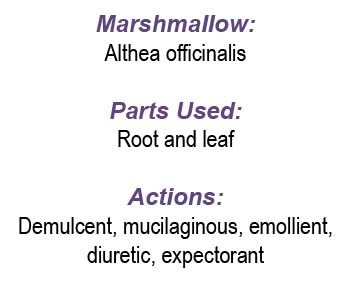 By Hilary Self, BSc (Hons), MNIM
By Hilary Self, BSc (Hons), MNIM
Most people think of marshmallow as a children’s sweet. And the confection was originally made from the plant. As with other herbs such as dandelion, two distinctive parts of the plant are used, depending on which area of the body is being targeted – the root and the leaves.
Getting to the root
The plant doesn’t just work in the stomach though – its soothing, protective and healing action is effective throughout the digestive tract, on any areas of inflamed mucous membrane, making it particularly effective for horses with digestive conditions such as constipation or diarrhea. I would always include marshmallow root in any herbal supplement I was preparing for a horse with a digestive disorder.
Marshmallow leaves
The leaves contain much smaller quantities of mucilage, which have a lighter effect on the reflex action of the nervous system. This means that when the leaves are ingested, they produce a reaction in the mucous membranes of more distant organs such as the kidneys, lungs, and bronchi. This is because the urinary and respiratory systems have a primitive nervous connection with the gut.
Marshmallow root is specific for digestive disorders, while the leaf is favored for respiratory or urinary problems. Marshmallow root can also be used externally; with its soothing, emollient and healing properties it is ideal for application to light burns, minor wounds or eczema. A poultice can be made from the powdered root. The plant’s excellent "drawing" properties make it ideal for soft swellings or drawing out infections. Powdered slippery elm bark can be added to further enhance these actions.
The benefits of mucilage
Marshmallow root contains large quantities of something called mucilage. Mucilage is a sticky, viscous sap, that, when ingested, absorbs water and other liquids, forming a protective layer over any inflamed mucous membrane. I always recommend the use of the root for horses suffering from gastric or duodenal ulceration. The mucilage not only soaks up excess stomach acids and inflammatory waste products which cause considerable pain when in contact with the ulcers, but also forms a protective layer covering the ulcer, and the sensory nerve fibers that transmit pain.
This accounts for why marshmallow leaf has always been favored for the lungs, kidneys and urinary tract. In the lungs, the effect is that of a soothing expectorant that will help reduce inflammation and pain in the respiratory tract. I like to use the leaf in herbal mixes for horses that present with irritable non-productive coughs, or those whose airways are affected by dust, hay spores or poor air quality, often resulting in the build-up of mucus in the lungs.
In the urinary system, the plant’s soothing properties will reduce pain and inflammation while supporting the healing of damaged mucous membranes. This makes the leaf ideal for use in cases of kidney, bladder and urinary tract conditions such as gravel, bladder stones or infections like cystitis, where the beneficial effects are helped by the plant’s diuretic action.
Article Used with permission by Hilary Self.
Hilary Self is co-founder of Hilton Herbs Ltd, a company that for the last 22 years has been at the forefront of manufacturing and formulating herbal supplements for animals. Hilary is a Medical Herbalist and a member of the National Institute of Medical Herbalists. Hilary is responsible for all the company’s formulations and for clinical research into the use of herbs for animals. In 2004 she received the Nigel Wynn award from the National Institute for innovative projects in herbal medicine, in recognition of clinical trials she undertook into the application of herbs for horses with Cushing’s disease. Hilary is also a member of the USA’s National Animal Supplements Councils (NASC) Scientific Advisory Committee.
Visit hiltonherbs.com for more information.
Did you know that Marshmallow is an ingredient in many of Advanced Biological Concepts’ Products, including ABC’s Plus®? Visit our Home page, www.abcplus.biz, to start shopping!
